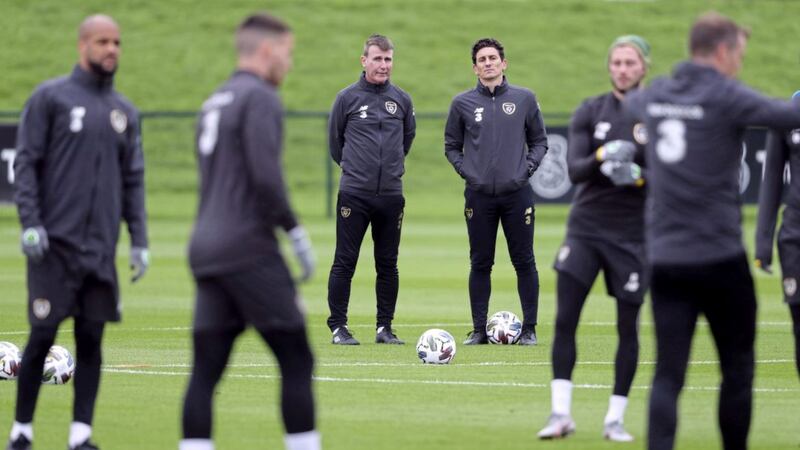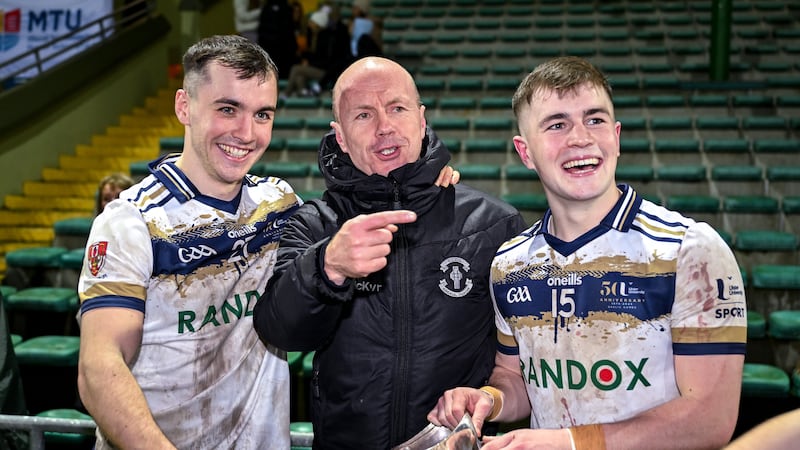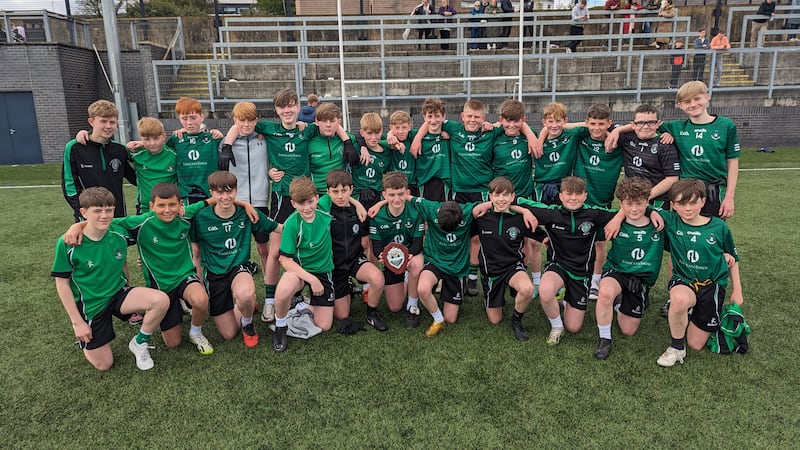FOUR games, two draws, two defeats and one goal. The Stephen Kenny era in numbers is off to an inauspicious start.
Yet for followers of the Republic of Ireland team, there has been a sense of enjoyment in watching the team that has only been tempered by the lack of cutting edge.
One of Mick McCarthy’s last games was a listless 2-0 defeat in Switzerland.
In the play-off semi-final with Slovakia last week, Ireland completed almost twice as many passes (489 to 255) as in that game.
Irish fans have been crying out for the team to stop treating the ball like it’s made of explosives.
It was only in Mick McCarthy’s first spell, when he was blessed with a group of players that had us spoiled really, that Ireland have ever moved away from the Jack Charlton methods.
And even then, when they reached the 2002 World Cup, it was two hoofs to Niall Quinn that brought them the goal against Germany and the late penalty against Spain that gave the whole show a glitzy feel.
I have been one of those same armchair supporters, tired of only adjusting out of the slouching position when James McClean’s cross is blocked by the first defender and the Aviva crowd goes mad with the excitement of winning a corner.
Perhaps, though, the beginning of the Kenny reign has been a lesson in being careful what you wish for.
Ireland played 32 competitive games under Martin O’Neill. During that time, they prided themselves on being hard to beat. That meant conceding possession and defending narrow.
In those 32 games, they scored 39 goals and conceded 30. They won 12, drew 12 and lost eight.
That is pretty much identical to the record of Giovanni Trapattoni.
In 34 competitive games, his Ireland team scored 34 goals, conceded 30 and had a win-draw-lose record of 14-13-7.
Ireland hadn’t been at a major tournament in 10 years before Trapattoni took an infinitely worse team to Euro 2012.
O’Neill took them to the Euros in 2016, but neither of them enjoyed the partisan support of the nation because, put simply, we all think the team has the capacity to be better to look at than it has.
Professional footballers can pass the ball 20 yards to each other. Stephen Kenny has had a minute timeframe in which to impress his own shape on the team, and it’s clear that the message is getting through.
But now the questions are being asked. Is this the right way for Ireland to play?
Because in trying to prove to the world that they’re better than hoofing it skywards and scrapping for it when it falls, they are leaving their flaws bare.
Better to look at doesn’t necessarily mean more effective.
It feels like a Godsend that Ireland haven’t played anybody in the last four games.
Bulgaria fell at the same hurdle as the Irish in the Euro 2020 play-offs while Slovakia face Northern Ireland for a place at the finals.
Wales and Finland qualified automatically for Euro 2020 but are unlikely to feature in the latter stages of next summer’s competition.
Stephen Kenny is now in the same risk-reward situation as GAA managers around Ireland contend with every week, at club and inter-county level.
From bottom to top, we all love the idea of playing silky, sexy, kicking football.
We all have visions of our team breaking from the back to score a goal like Declan Meehan in the 2000 All-Ireland final replay.
It’s why ultra-defensive gameplans can have a very limited shelf life.
For players that are not used to winning, bolting the doors shut can bring a team to a new level of competitiveness. And when they’re winning, everything seems enjoyable.
Once the momentum stalls, players inevitably begin to question the gameplan. And even if there’s a vault full of evidence that attacking football will only expose your weaknesses, you’ll still want to try it.
The other way is dull and monotonous and it only appeals when you’re winning.
Problem is that wins also breed confidence, arrogance and a false sense of belief.
For the vast majority of teams, playing on the front foot against smarter, better opponents is a fast-track to being exposed.
It’s been interesting to see the reaction to Jim McGuinness linking up with Galway.
He had met with Paraic Joyce and his management team several times before the training session on Sunday, the start of what is likely to be a season-long relationship at least.
Galway were much maligned for their style under Kevin Walsh, yet he brought them from the wilderness into the realm of Connacht titles, Division One football and sitting with the high kings of Gaelic football once more.
The style they employed under him was grossly unpopular with most people, including many of their own supporters, but for a decade-and-a-half before him, Galway had been trying to do it the other way and failing miserably.
Joyce has come in and during the League, he had them playing some outstanding attacking football, and they were thriving even in the absence of Damien Comer.
Shane Walsh was revelling in a role closer to goal and as the resumption beckons, they sit top of Division One.
They will not win an All-Ireland playing that way, however. Their defence simply isn’t good enough to cope with the extra pressures.
The same applies to Donegal, who have been finding a new way under Declan Bonner, but whose ability to concede 1-20 will ultimately undermine their ability to score 1-19.
In employing the services of McGuinness, Galway have brought in a man whose pragmatic approach brought his native county from nowhere to being All-Ireland champions in the space of just two years.
They needed to be horrible to play against in 2011, and they were.
In 2012, they were still horrible to play against, but they were fitter and in Colm McFadden, they had a forward who couldn’t miss.
As Dublin have evolved this decade, other teams around the top have cottoned on that you need to score at least 20 points to beat them, no matter how you defend. That is what is ultimately driving the trend away from ultra-defensiveness.
But for most teams, chasing 20 points would mean they could concede 40.
Outside the top six, nobody has the players to go at the better teams with a to-hell-with-it approach. That’s what they’ve largely been doing in Leinster for a decade, and look where that’s got them.
We all aspire to be Dublin or Kerry or the All Blacks or Barcelona or Brazil, able to woo because the talent is there to do it.
The teams with the best players at any level, from international football to junior club championship, are the ones for whom attack is usually the best form of defence.
Ireland under Stephen Kenny are perhaps discovering why the ugly approach of O’Neill and Trapattoni might be something we come to long for once more.








